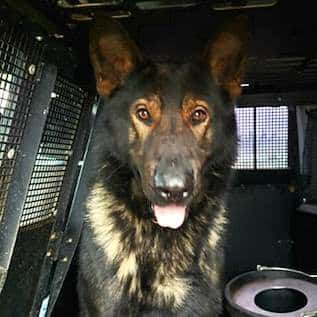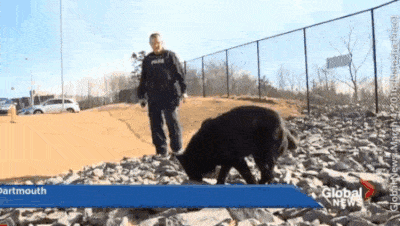RCMP misled the public: "Police Dog" vs Cadaver Dog
“…RCMP dogs…don't have the Cadaver training. If you had…a body buried that was 2—3 years old, that's where Cadaver Dogs come in.”
Summary
Following the December 2020 search at 827 Nanaimo Lakes Road, RCMP investigators misled the public by implying that the dog used during the search would have been able to locate Lisa's remains when in reality it lacked the necessary training. (A "police dog" is not the same as a cadaver dog.)
A specialized cadaver dog and handler could have been brought in from another RCMP jurisdiction, but was not.
Details
After the RCMP's December 2020 search of the property at 827 Nanaimo Lakes Road, RCMP investigators told the media the search was related to Lisa's case, and said new technology
was used, including a police dog and Ground Penetrating Radar.
[3][4][5][6] This statement could be considered to be misleading.
Police Dogs

Luca, Nanaimo RCMP's police service dog (PSD)
NanaimoNewsNow, Jan 29, 2021 (source)
RCMP police dogs — formally known as Police Service Dogs (PSDs) — are all German Shepherds, bred internally by the RCMP, from one of 18 bitches in Saskatchewan.[7] Training takes place at the RCMP's Police Dog Service Training Centre (PDSTC)[8] located in Innisfail, Alberta.[9]
All the RCMP dogs that are trained across Canada from Newfoundland to B.C. will find human remains, but they don't have the cadaver training,says Sgt. Rick Bushey, co-ordinator for RCMP Police Dog Services in Nova Scotia.
If you had an area where you thought there was a body buried that was two to three years old, that's where cadaver dogs come in.
— Sgt. Rick Bushey
RCMP Police Dog Services
Cadaver Dogs

Doc, Canada's 1st Cadaver Dog (2016)
Global News, March 4, 2016 (Natasha Pace)[10]
Training of a Cadaver Dog can take years.[11]
There are not many Cadaver dogs in Canada; the first was "Doc" in Nova Scotia, who in 2016 completed training by the use of actual human tissue[10][12]
Doc, who also has training and experience with locating explosives, was (as of 2016) the RCMP's first and only cadaver dog, trained to help with older missing persons cases
and was currently working with RCMP across Atlantic Canada.
[1]
As of June 2023, there were a total of 12 cadaver dogs in Canada.[13]
If the lead investigator of a file, in consultation with the police dog services, determines a human remains detection dog is required, "efforts will be made to assist" regardless of the geographic location. The Department of Justice and Public Safety decides when and if to send the human remains canine team in response to a police request.[13]
Human Remains Detection training
Any dog, including Police Services Dogs, can attend "add-on" human remains detection training in seminar-style courses ranging in duration from 8 hours[14] to one week.[15]
Training is usually completed by the use of artificial training material such as commercially-available synthetic cadaver odours.[16] This method is considerably less effective or intensive than that of a dedicated Cadaver Dog. The training does not include detection of human remains buried under concrete, [17] as does the training of a dedicated Cadaver Dog — which can detect human remains that have been buried below concrete for decades.[18]
A cadaver dog would have been required to detect Lisa's remains, buried several feet below concrete for two decades.
Luca's training
Nanaimo RCMP brought "Luca" along for the search.[19]
Luca is a standard police dog, bred and trained to track and immobilize suspects,[20] but not to locate human remains which have been buried below concrete for 20 years — as a specialized cadaver dog is able to.
Four months after the search, it was reported Luca had received training in the detection of human remains.[21]
Learn more → How Cadaver Dogs Are Trained (BuzzFeed News)
See also
- 827 Nanaimo Lakes Road
- Timeline: July 1, 2002
- RCMP vs Crime Stoppers
- RCMP's improper GPR usage rendered scan useless
Sources
- ↑ 1.0 1.1 RCMP Gazette (Oct 3, 2016),
Cadaver dog helps close cold cases
(source) - ↑ Blair Gilmore, Royal United Services Institute (May 14, 2017), "RCMP Human Remains Detection Dog – Innovative Research in Nova Scotia"
- ↑ Karl Yu, Nanaimo News Bulletin (June 26, 2021),
Nanaimo RCMP use new information and technology in case of missing woman Lisa Marie Young
(source) - ↑ Eric Plummer, Ha-Shilth-Sa (June 26, 2021),
'Bring peace to Lisa': Police continue with investigation using new techniques
(source) - ↑ Ian Holmes, NanaimoNewsNow (June 26, 2021),
New information in Lisa Marie Young's disappearance after several people come forward
(source) - ↑ Karl Yu, Van Isle Free Daily (June 26, 2021),
New information and technology help Vancouver Island RCMP in case of missing woman
(source) - ↑ RCMP (October 11, 2023) "Police Dog Service Training Centre"
- ↑ RCMP (October 11, 2023) "Our Police Service Dogs"
- ↑ Friends of the Mounted Police Heritage Centre "Pillars of the Force: Police Service Dogs"
- ↑ 10.0 10.1 Natasha Pace, Global News (Mar 4, 2016),
Meet Doc, the first RCMP cadaver dog in Canada
(source) - ↑ Mason Brighton, Spectrum News (October 20, 2022),"What goes into training a cadaver dog"
- ↑ Kevin Maimann, Toronto Metro (November 7, 2017), "Incredible unused tool: RCMP officers train dogs to detect human remains"
- ↑ 13.0 13.1 Bobbi-Jean MacKinnon, CBC News (June 25, 2023), "Pennfield man's case raises questions about need for dogs that can find human remains" cbc20230625
- ↑ Indiana Department of Homeland Security "Basic Land Cadaver/HRD Search Techniques for K-9s"
- ↑ Dog Trainer College (November 9, 2023) "Cadaver Detection Training Course"
- ↑ ScentLogix "Cadaver Scent-Reference Material"
- ↑ Natasha Dilkie, Nova Scotia Medical Examiner Service (October 1, 2017), "Human Remains Detection: Validity of RCMP Dog Training using Donated Human Remains through the Nova Scotia Medical Examiner Service"
- ↑ Mara Bovsun, American Kennel Club (November 9, 2023), "How Cadaver Dogs Help Find Dead Bodies"
- ↑ Cyndy Hall, Facebook (November 7, 2023), "Luca searching for Lisa"
- ↑ Alex Rawnsley, The Wolf 106.9 (March 13, 2021), "Training of local Police Dog Service on display in Nanaimo neighbourhood (video)"
- ↑ Alex Rawnsley, NanaimoNewsNow (March 13, 2021), "VIDEO: Training of local Police Dog Service on display in Nanaimo neighbourhood"